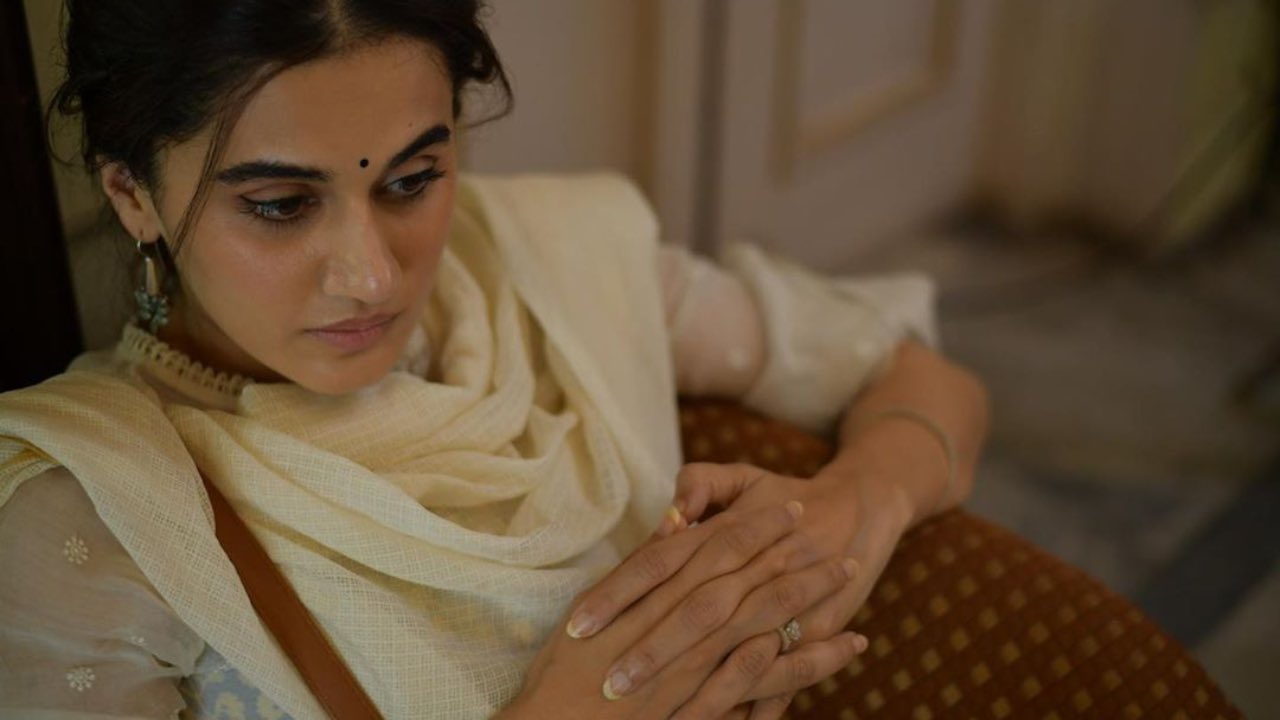
By now, we are all aware that Anubhav Sinha’s Thappad has its turning point in a despicable act of impulse. A young man slaps his wife. As it rightly turns out, the film is not singularly about a slap that provokes a woman to ask her way out of the marriage. Filled with an array of characters going through disparate experiences, Thappad made me ask a couple of pertinent questions. How easily will a married woman let go of her privileges? What if her definitions of love and self-respect contradict with the sense of comfort that her carefully nurtured household gives her? Anubhav Sinha’s film addresses these questions with clarity and maturity. It offers a perspective that belongs to its protagonist Amrita (Taapsee Pannu) but is eventually seen trickling down to the environment surrounding her. As a matter of fact, Thappad offers no solutions. It instigates a conversation that might irk flagbearers and apologists of deep-rooted patriarchy.
The film opens with Amrita living a content life with her husband Vikram (Pavail Gulati) and mother-in-law (Tanvi Azmi). A housewife, her life is devoid of surprises. It follows a time table that has naturally come into place, without anyone imposing it on her. She loves this routine. We observe how she walks a tightrope as far as her interactions with Vikram are concerned. She balances the warmth of a mother with a tolerant girlfriend’s wit. She is careful so as to not spoil the decorum of the family which only worries about man’s well-being. “Vikram theek se soya?”, is all that the family matriarch asks her in the morning. The arrangement is one that even Amrita has come to agree with. Because the societal conditioning tells you how a married woman is meant to live for everyone else but herself.
Amid a glitzy house-party occurs the twist in the tale – the slap. Everyone is alarmed – more for the situation that arises and less for the actual condemnable act. Amrita freezes and retires into her room. The mother-in-law is quick to state, “Come down, what will others think? It’s a family matter, we shall solve it.” The woman, a victim herself, had sacrificed her dreams and self-respect in exchange for her family’s well-being. “Mere bachche khush hai,” says she in another scene.
In the film’s finest stretch, we perceive Amrita quietly making sense of the situation. She still performs everything that the dutiful wife in her was accustomed to. It is act of reflex – to get up early, make a cup of lemongrass tea for herself, stand by the balcony, indulge in the daily cooking chores and so on. There is no dialogue, even when Vikram tries to cheer up by taking her to dine out. In retrospect, Vikram does not apologize either. Instead, he expresses regret by citing, “ho jaata hai yaar, it happens”. For a man who has listed out life goals in his diary, Vikram comfortably forgets to enlist his impulses and their consequences. As a result, Amrita leaves – dismantling the peaceful ecosystem that she had constructed herself in his home. For once, Amrita felt the need to recognize her own identity, which was distinct from that of being Vikram’s doting wife.
Amrita’s family comprising of her parents (Ratna Pathak Shah, Kumud Mishra) and her brother Karan (Ankur Rathee) form a far better family unit – especially with the father being a compassionate, sensitive person who holds them together. While the parents have their share of exchanges in order to understand the compromises that a woman is supposed to make in her marital life, they are empathetic when it comes to supporting their daughter. There is a sober yet moving moment where Amrita asks her father, “Am I doing something wrong?” and he comes up with a balanced answer.
Anubhav Sinha along with Mrunmayee Lagoo must be duly applauded for the screenwriting in Thappad because it is amongst the most astute, most vividly observed ones to come out of Hindi cinema in a long time. At no point does the film propagate an anti-men agenda. The couple’s neighbour Shivani (Dia Mirza) is a delightful proof to this angle. Not all of Sinha’s characters may have a dialogue to utter (Vikram’s bhabhi, for instance) but they are there, quietly exemplifying the problematic maxims of Indian society which are in dire need of a change. If Vikram finds it necessary to say ‘sorry’ to his senior colleague who was a part of the brawl at his residence, it is lowly of him to express the same to Amrita – even if it is a fake tactic to get her back. He attempts to mend bridges with an expensive bracelet and a token statement – ‘I love you’. You also see working women who are silent sufferers at the hands of the men in their lives. Be it an affluent lawyer Netra (Maya Serao) or Amrita’s boisterous housemaid Sunita (Geetika Vidya Ohlyan). If the former desires love and respect at home, the latter craves for little joys such as watching ‘Dance India Dance’ on television when she happens to be an equal breadwinner. Sinha beautifully links these two women to Amrita’s story, projecting how the suffering does not come with a class criterion. It is across the board.
Thappad is filled with outbursts and confrontations between the leads. While each of them is of great effect, the one inside the lawyer’s (Ram Kapoor) office stands out. Reminiscent of 2019’s marvellous Marriage Story, the conversation often gets high octane but in a delectable fashion. It is particularly appreciable how the writers employ the word ‘activist’ to describe a woman who demands nothing but her rights. Upon spotting her giving a piece of her mind to the devious Vikram, Maya tells Amrita, “Sunai to nahi diya par sur ekdum perfect tha,” Indeed, a rare joy to see a woman cheering for another in a film, with all heart.
Filmmaking wise, Thappad is easily Anubhav Sinha’s best. The stillness in Amrita’s mind is easily equated through elements such as costumes, colour schemes and production design. Even the camera’s motion – sometimes still, sometimes swift pans – are in tandem with its protagonist’s mindscapes. Even the shehnai strains that underscore a bitter fight between Amrita and her spouse is nothing but symbolic of so many things. We see how rituals (such as pujas and the customary touching of feet) are observed with passion but the society, by and large, refuses to dissect its fallacies.
If we sit back and recount the brilliance in the film’s character designs and overall scene segmentation any more, the list will be quite long. Let me just end it by mentioning the climactic outburst which sees Amrita with the two important women in her life – her mother and her mother-in-law. Every word, every twitch in the eyebrow are of mammoth impact and only the stone-hearted would not take away the message that the film intends to convey.
Thappad is ably helped by a wholesome cast who are terrific through and through. If Taapsee Pannu (once again) screams from the rooftop that she is the generation’s very best, newcomer Pavail Gulati is flawless as the bitter Vikram. Among the supporting cast, Maya Serao and Geetika Vidya Ohlyan are consistently terrific in their finely etched characters. An understated Tanvi Azmi is in her elements whereas Kumud Mishra and Ratna Pathak Shah steal the show whenever they appear on the screen. If Dia Mirza is a picture of poise, Manav Kaul in a brief role quietly highlights the privilege that being male in the Indian society brings along.
Among the bits that I didn’t fully subscribe to, there is the scene in the end where Vikram chats with Amrita. The scene, even though necessary, is somewhat marred by exposition. I could totally decipher why the receptive writers decided to design it that way. The film essentially caters to a crowd that has come to romanticize a movie dialogue that goes, Thappad se darr nahi lagta hai saab, pyaar se lagta hai,“ and over a thousand films that showed us how a slap was instrumental in taming a shew that a woman proves to be in a man’s world. It talks to cinema lovers who find it easy to forgive Kabir Singh‘s protagonist for his misgivings. It engages in a dialogue with each one of us who have come across essays in school that read ‘Role of Women in the Society’. In a rare instance, we get a film that consciously and confidently questions the ‘role of men’. There are minor pacing issues in certain sequences – notably in the second third act. Barring that, Thappad has to be one of the most accomplished Hindi films to come out in a very long time. I am not stating this as a token to underline the nobility of the cause. It is indeed very well-intentioned but is equally well-conceived, acted and executed. Thappad does not make compromises or take side roads to reach its destination. It knows where to go and how to get there. The morals are intact and so are the semantics to express them.
The argument may arise from certain quarters on how the film’s messaging is pro-divorce. It isn’t. Thappad is pro-human rights. It is pro-equality. It says how every individual, irrespective of their genders, have the right to their choices. It tells every individual to know where to draw the lines. It might as well empower one to say a firm ‘no’ to things that do not acclimatize with their value system. Thappad tells you how it is perfectly alright for a woman to walk out of a marriage that isn’t giving her love or happiness. It is okay for a housemaid to refuse a sudden hike in her remuneration. It is liberating to see a successful woman disowning the extra-label of her illustrious in-laws to start afresh. It also refreshing to see a successful single mom choosing not to remarry after her loving husband’s demise. Thappad, that way, is a celebration of women who dare to make their own choices and be the owner of their own lives. The narrative might as well be about a man wanting to question a diktat or two set by society. Speaking of that route, we have already seen and endured a Ki and Ka which, despite its righteous objectives, couldn’t stop its leading man from looking like a substandard individual. Well, weren’t we talking about Anubhav Sinha and some exemplary filmmaking until now? Let’s stick to that.
Rating: ★★★★ 1/2

